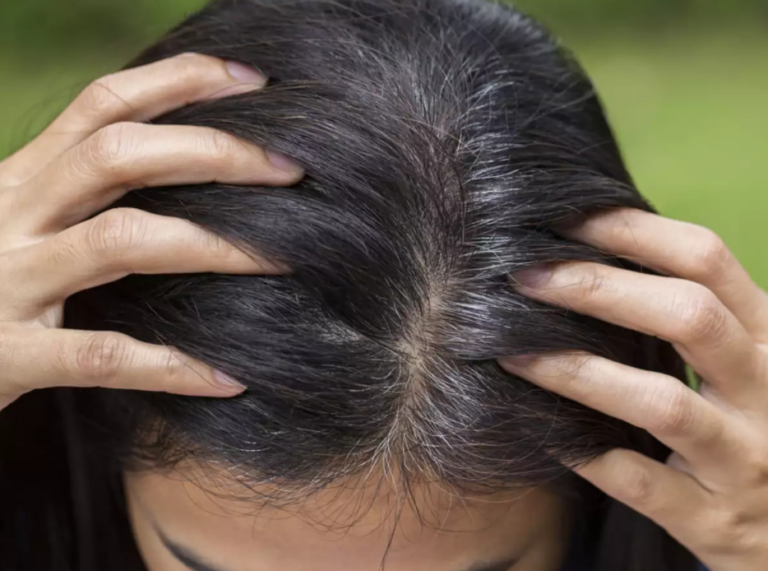What causes sores on your scalp? Do you have a distressing and painful scalp or grievous bump-like itchy head? Well, you may have sores on your head
Generally, sores can appear anywhere on the skin or in tissues lined with mucous membranes. A sore on your head is more or less a lesion of the skin.
Signs to tell you to have scalp sores
These are some of the leading signs or symptoms of these lesions
- Scalp pain or areas affected are may be painful
- Tender scalp
- Itchy scalp
Possible causes
What causes sores on the scalp?
Head lice painful – sores on scalp
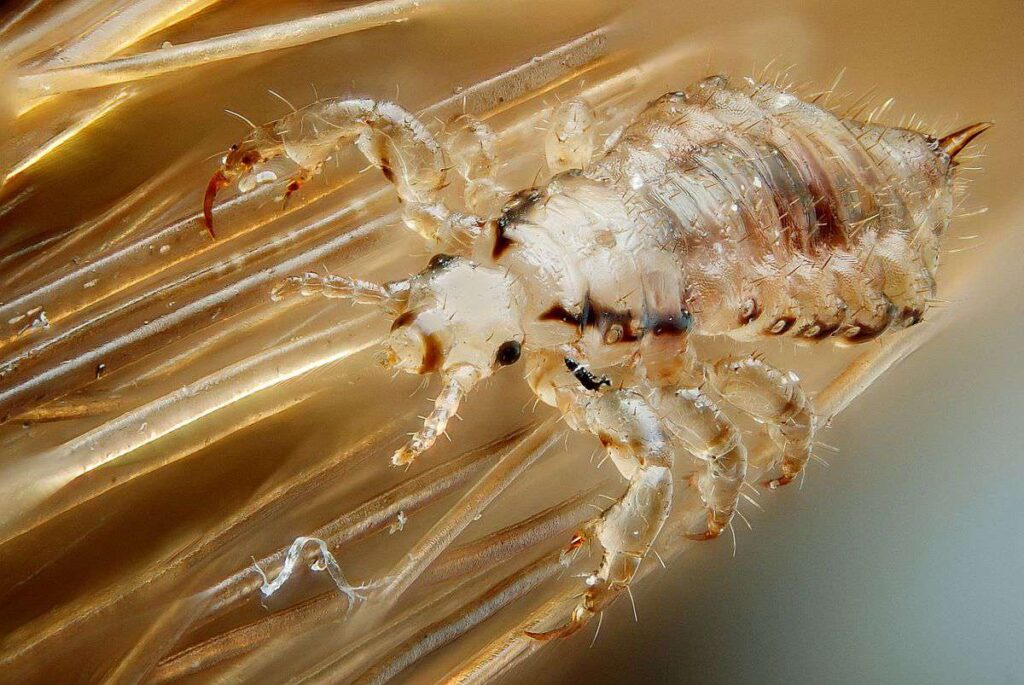
The lice are small crawling insects that feed on human blood by biting and sucking. If you have lice on head or in hair you will be able to see small grayish wingless animals that crawl. Moreover, eggs (nits) which look like sesame seeds, usually get attached to hair or closer to the scalp. After they hatch, they leave clear shells on the head.
Signs and symptoms
Head lice cause small sores on scalp. Presence of small red bumps or sores is the common sign one has head lice. Other symptoms include:
- (Intense) itching especially after infestation
- Crawling sensation
- Difficulty sleeping due to pain
- Tickling sensation
Sores on the scalp caused by head lice are usually painful. Note that your child can still have head lice and not itch or scratch the scalp until they have caused harm. Sometimes, young children become irritable due to lice infestation.
If an infestation of head lice occurs it leads to pediculosis capitis which is contagious.
Anyone can get head lice but school going children are victims. The common ways in which the head louse is spread from one person to another include sharing, touching and while seated close together.
Discoid lupus or chronic cutaneous lupus
Lupus can cause rashes on skin or sores. There are 3 known types of lupus namely, chronic cutaneous lupus, sub-acute cutaneous lesions and acute cutaneous lesions.
Discoid lupus is a skin disease with disk-shaped, round lesions or sores often red thick with a scaly appearance/texture.
Does lupus cause hair loss? Scalp sores caused by chronic cutaneous lupus may result in permanent hair loss over time. According to Lupus Foundation of America, discoid lesions that have shown abnormalities like skin discoloration over a long time is a risk for development of skin cancer.
With time, exposure of your body to UVR usually worsens the condition of lupus.
Treatment or prevention?
Topical treatments are most commonly used for mild to moderate symptoms are shown in cutaneous lupus. Nevertheless, preventive measures and treatment is a better option. These include methods of protection against direct UV radiations like use sunscreen lotions and caps with a wide brim when you are outdoors.
Acne Keloidalis Nuchae
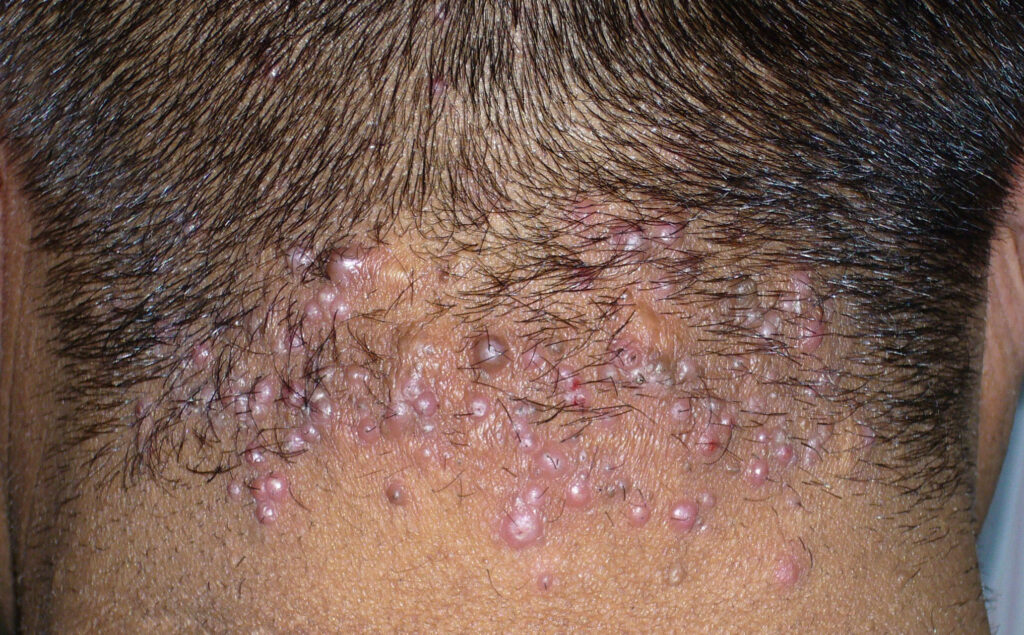
The lesions due to acne keloidalis begin as “follicular papules; evolve into a firm, keloidal nodule,” and are typically limited to the occipital scalp nearer to the neck.
Folliculitis
Folliculitis is a condition affecting the hair follicles or tiny pouches located in skin from which hair grows. Folliculitis (the medical term for inflammation of the hair follicles) begins as small, red tender areas around a single hair or multiple hairs growing together.
Folliculitis increases the chances of infection. And when there is an infection, the follicles create pimple-like things that are itchy or burning with pus. Chronic folliculitis leads to lesions on the scalp.
Kerion (inflammatory Tinea capitis)
Another cause of sores or lesions on the scalp is inflammatory Tinea capitis. It is caused by Tinea capitis which is a medical term for the yeast of the skin on the scalp.
Unlike folliculitis, kerion is influenced by a fungal infection. It is identified by pustules with tender areas. Individuals with kerion may experience fever.
Risk factors
The following are some of the factors that increase the occurrence of sores on your head.
Scalp psoriasis
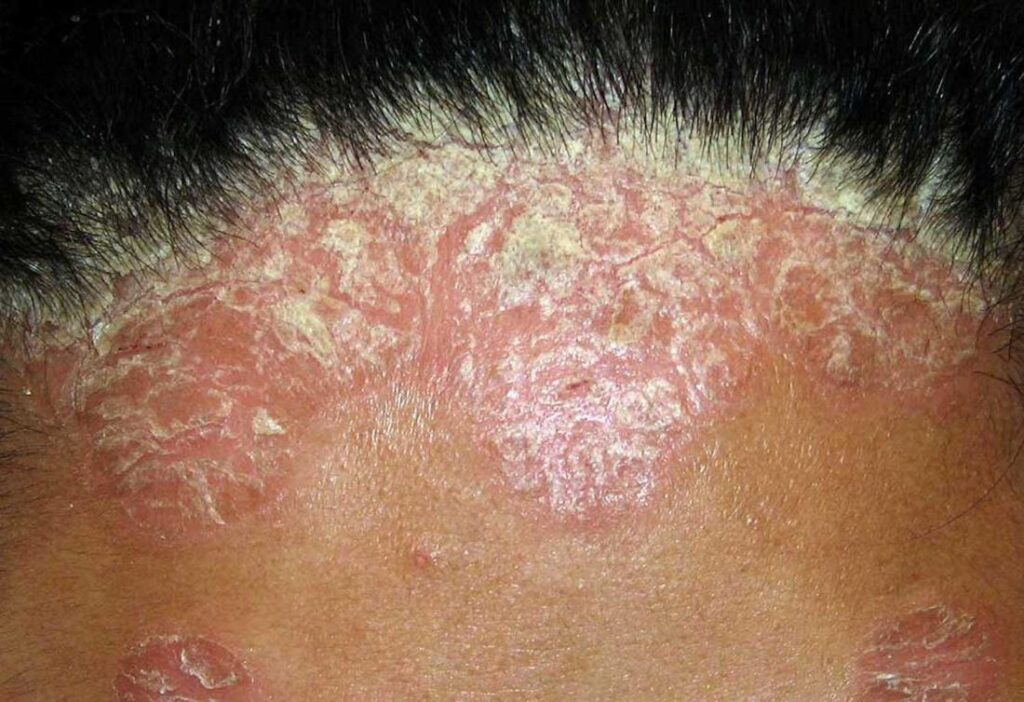
People who have this type of psoriasis have a scalp itch simultaneously. Psoriasis can be mild or severe. According to the National Psoriasis Foundation (NPF), severe scalp psoriasis can lead to the formation of thick, crusted plaques covering the entire scalp.
This condition can be mistaken for other skin conditions such as seborrheic dermatitis. Read here for remedies to reduce and manage scalp itch.
Treating this condition will reduce the risk associated with the formation of sores on the head. Although difficult, this condition can be treated with topical treatments. Sometimes these treatments are usually combined (including systemic treatments) especially if the symptoms are severe.
For individuals with moderate symptoms to severity such as crusting, you need to see your dermatologist who will determine the best treatment that responds according to your medical situation.
Other scalp problems
- Cellulitis of the scalp (rare)
- Dandruff
- Ringworms on scalp
- Impetigo
Do sore scalp cause hair loss
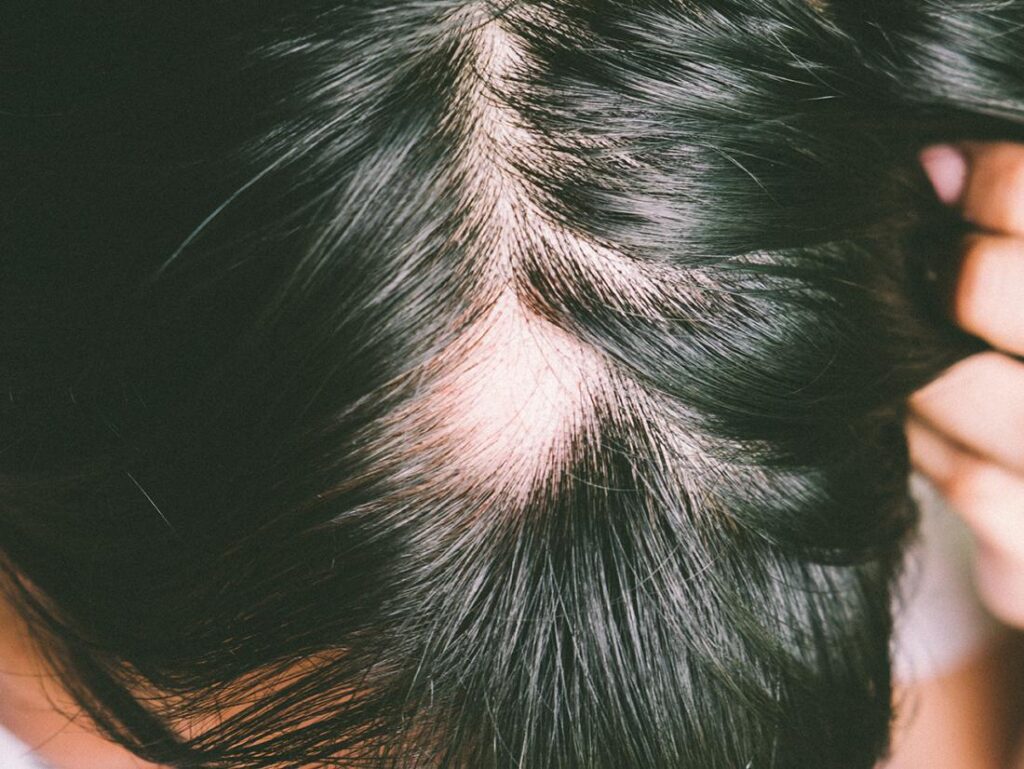
Scalp problems involving loss of hair are a life disappointment when you desperately need that hair. We earlier saw how lupus can consequently lead to hair loss.
Other causes of hair loss regardless of whether you have sores on head comprise the following things.
- Diseases like hyperthyroidism
- Side effects of chemotherapy or radiation therapy
- You can also experience hair loss after a recent head surgery
- Heavy metal poisoning thallium or arsenic poisoning
- Mental problems such as Trichotillomania
- Damage or injuries to hair shafts
Treatment and remedies
Treatment of sores on the scalp depends on the causes. This upsetting problem can also be treated according to the symptoms of the specific underlying cause. Let us look at some of the effective methods of head lice treatment at home. (These may include dermatological methods or tips).
Treating sores on the head caused by head lice
Before treating someone you suspect that they have lice (infestation), try to carry out some investigation by simply doing a thorough physical examination using a comb under bright light.
Using scalp sores shampoo
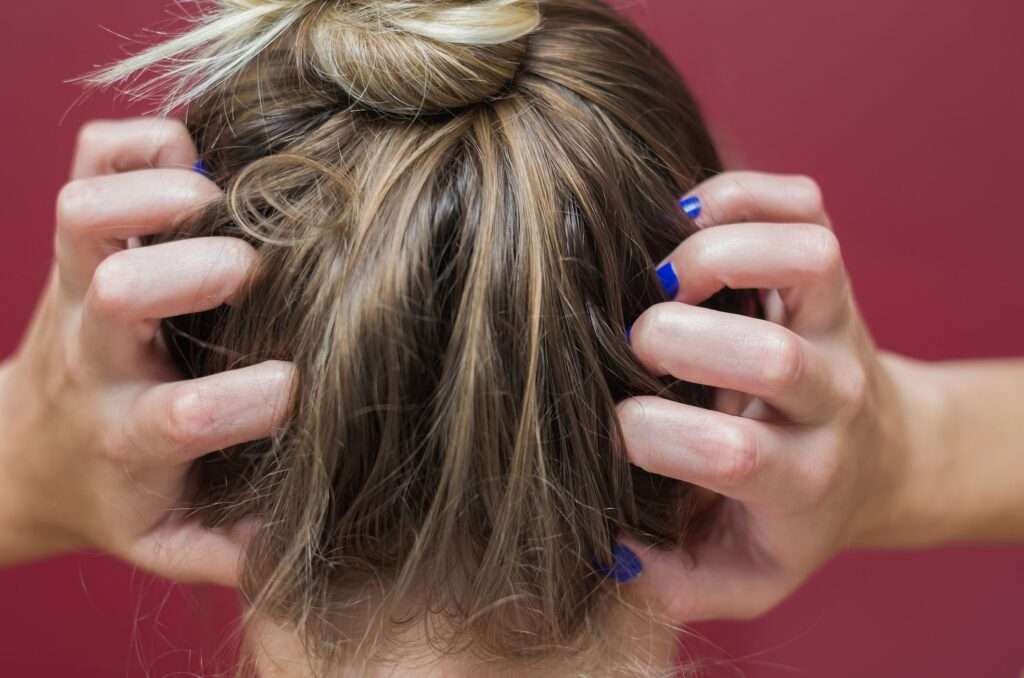
Before using the lice shampoo, take your time to read through the instructions and take the age of the affected ones. You can acquire various products for shampooing from the drug stores or get yours from your doctor.
Procedure: Apply the recommended amount of shampoo to leather. If you are shampooing someone with longer hair, ensure that his/hair is wet sufficiently with shampoo.
Some shampoos for sores on the scalp can potentially produce harmful systemic effects if they are absorbed by the skin. Therefore, it is advisable to ask your physician for help on the kind of shampoo for scalp sores. Lindane shampoo is one of the approved prescription treatment for head lice.
IMPORTANT: Parents are highly advised to consult a physician before using most of the shampoos for head sore treatment.
Home treatment
If treatment does not clear the head lice or keep appearing again after treatment, consider doing home-treatment as follows.
- Soak combing and brushing items and equipment in hot water for at least 10 minutes to kill the nits
- You may also place all your plastic accessories including helmets and earphones in a freezer up to 2 days after every usage
- Vacuum all your utensils and furniture to clear up all nits and scattered lice
- Use superheated water to clean all the pillows, bed sheets, blankets and towels. Practically, all cleaning should be done on a 2 day-routine for it to be worth of treatment
Dermatological treatment
In addition to the above treatment methods see your dermatologist. Dermatologists use prescription medication to safely kill the eggs and mature head lice. Medications used here include:
- Medicated shampoo for scalp sores
- Benzyl alcohol lotion
- Malathion lotions
- Ivermectin lotions
When should I see a physician
Truthfully, head sores are one of the painful problems one can go through. Kindly see your physician when your symptoms become progressively persistent or notice draining from the lesions on the head or any part of your skin affected. Lastly, if you get a sore scalp and hair loss occurring with time.

